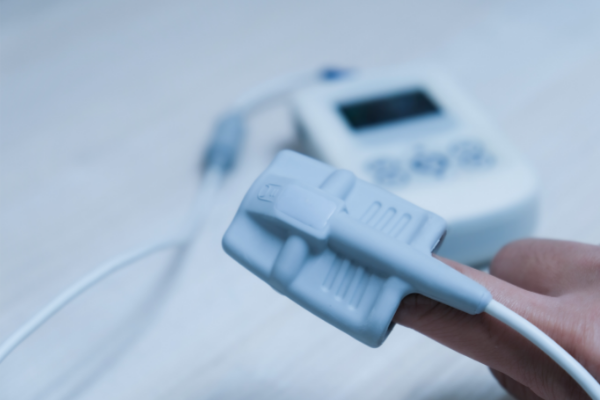1. Function and principle
According to the spectral characteristics of oxyhemoglobin (HbO2) and reduced hemoglobin (Hb) in the red light and infrared light regions, it can be seen that the absorption of HbO2 and Hb in the red light region (600-700nm) is very different, and the light absorption and light scattering of blood The degree greatly depends on the blood oxygen saturation; while in the infrared spectral region (800~1000nm), the absorption is quite different. The degree of light absorption and light scattering of blood is mainly related to the content of hemoglobin. Therefore, the content of HbO2 and Hb are different in absorption. The spectrum is also different, so the blood in the blood catheter of the oximeter can accurately reflect the blood oxygen saturation according to the content of HbO2 and Hb, whether it is arterial blood or venous blood saturation. The ratio of blood reflections around 660nm and 900nm (ρ660/900) most sensitively reflects changes in blood oxygen saturation, and general clinical blood oxygen saturation meters (such as Baxter saturation meters) also use this ratio as a variable. In the light transmission pathway, in addition to arterial hemoglobin absorbs light, other tissues (such as skin, soft tissue, venous blood and capillary blood) can also absorb light. But when the incident light passes through the finger or earlobe, the light can be absorbed by the pulsatile blood and other tissues at the same time, but the light intensity absorbed by the two is different. The light intensity (AC) absorbed by the pulsatile arterial blood changes with the change of the arterial pressure wave And change. The light intensity (DC) absorbed by other tissues does not change with the pulse and time. From this, the light absorption ratio R in the two wavelengths can be calculated. R=(AC660/DC660)/(AC940/DC940). R and SPO2 are negatively correlated. According to the R value, the corresponding SPO2 value can be obtained from the standard curve.

2. Features and advantages of the probe
The SPO2 instrument includes three main components: probe, function module and display part. For most monitors on the market, the technology for detecting SPO2 is already very mature. The accuracy of the SPO2 value detected by a monitor is largely related to the probe. There are many factors that affect the detection of the probe. The detection device, medical wire, and connection technology used by the probe will affect the detection result.
A·Detection device
The light-emitting diodes and photodetectors that detect signals are the core components of the probe. It is also the key to determining the accuracy of the detection value. In theory, the wavelength of red light is 660nm, and the value obtained when infrared light is 940nm is ideal. However, due to the complexity of the manufacturing process of the device, the wavelength of the red light and infrared light produced is always deviated. The magnitude of the deviation of the light wavelength will affect the detected value. Therefore, the manufacturing process of light-emitting diodes and photoelectric detection devices is very important. R-RUI uses FLUKE’s testing equipment, which has advantages both in accuracy and reliability.
B·Medical Wire
In addition to using imported materials (reliable in terms of high elastic strength and corrosion resistance), it is also designed with double-layer shielding, which can suppress noise interference and keep the signal intact compared with single-layer or no shielding.
C·Cushion
The probe produced by R-RUI uses a specially designed soft pad (finger pad), which is comfortable, reliable, and non-allergenic in contact with the skin, and can be applied to patients of different shapes. And it uses a fully-wrapped design to avoid interference caused by light leakage due to finger movements.
D finger clip
The body finger clip is made of fire-resistant non-toxic ABS material, which is strong and not easy to damage. A light-shielding plate is also designed on the finger clip, which can better shield the peripheral light source.
E·Spring
Generally, one of the main reasons for SPO2 damage is that the spring is loose, and the elasticity is not enough to make the clamping force insufficient. R-RUI adopts high-tension electroplated carbon steel spring, which is reliable and durable.
F terminal
In order to ensure the reliable connection and durability of the probe, the attenuation in the signal transmission process is considered on the connection terminal with the monitor, and a special process gold-plated terminal is adopted.
G·Connecting process
The connection process of the probe is also very important to the test results. The positions of the soft pads have been calibrated and tested to ensure the correct positions of the transmitter and receiver of the test device.
H·In terms of accuracy
Ensure that when the SPO2 value is 70%~~100%, the error does not exceed plus or minus 2%, and the accuracy is higher, so that the detection result is more reliable.
Post time: Jun-24-2021

